When it comes to exploring the flavors of Japanese cuisine, one cannot overlook the delightful tang of ponzu sauce. This versatile condiment, characterized by its zesty and citrusy profile, has gained popularity beyond its country of origin. However, for individuals with gluten sensitivities or those who follow a gluten-free diet, there is a lingering question: Is ponzu sauce gluten free?
Ponzu sauce traditionally contains soy sauce, which is made from fermented soybeans and wheat. As a result, it is not gluten-free. People with gluten sensitivities or celiac disease should be cautious when consuming ponzu sauce or look for gluten-free alternatives.
What is Ponzu sauce?
Ponzu sauce is a Japanese citrus-based sauce that typically contains soy sauce, citrus juice (such as lemon or lime), rice vinegar, and mirin (a sweet rice wine).
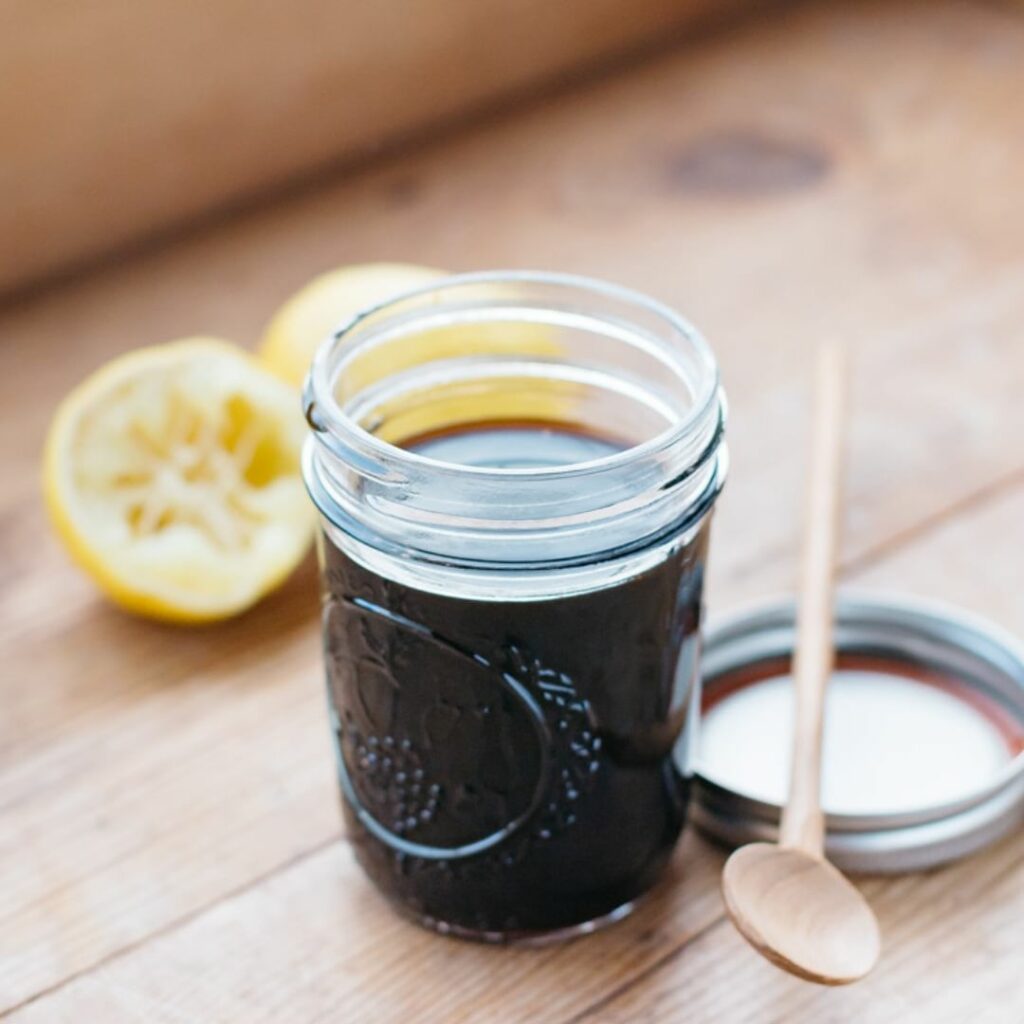
The ingredients in Ponzu sauce can vary depending on the brand and recipe. Here are some common ingredients found in Ponzu sauce:
- Soy sauce – This is the base ingredient for most Ponzu sauce recipes. It provides a salty and umami flavor.
- Rice vinegar – Rice vinegar is typically added to Ponzu sauce to provide a tangy flavor.
- Citrus juice – Citrus juice, such as lemon or lime juice, is added to Ponzu sauce to provide a citrusy flavor.
- Mirin – Mirin is a type of sweet rice wine that is often added to Ponzu sauce to balance out the saltiness.
- Bonito flakes – Some recipes may include bonito flakes, which are dried fish flakes that add a savory flavor.
- Kombu seaweed – Kombu seaweed is another ingredient that can be added to Ponzu sauce for a savory flavor.
Ponzu sauce has a unique and tangy flavor profile. It combines the savory umami taste of soy sauce with the bright and citrusy notes of lemon or lime juice. Additionally, it often contains a hint of sweetness from ingredients like mirin or sugar. The combination of these flavors creates a refreshing and zesty taste that pairs well with various dishes. The acidity from the citrus helps to balance out the richness of other ingredients and adds a vibrant element to the overall flavor of the sauce.
Is ponzu sauce gluten free?
As mentioned above, ponzu sauce traditionally contains soy sauce, which is commonly made with wheat and contains gluten.
But there are gluten-free versions of soy sauce available. If you use a gluten-free soy sauce or tamari as an ingredient in your Ponzu sauce, it should be safe for those who follow a gluten-free diet. However, it’s always important to check the specific ingredients and labels of the Ponzu sauce you are purchasing or making to ensure it is gluten-free, as different brands and homemade recipes may vary.
What are gluten-free Ponzu sauce brands?
If you’re looking for gluten-free Ponzu sauce brands, several options are available. Here is a list of some of the most popular gluten-free Ponzu sauce brands:
San-J Gluten-Free Ponzu Sauce
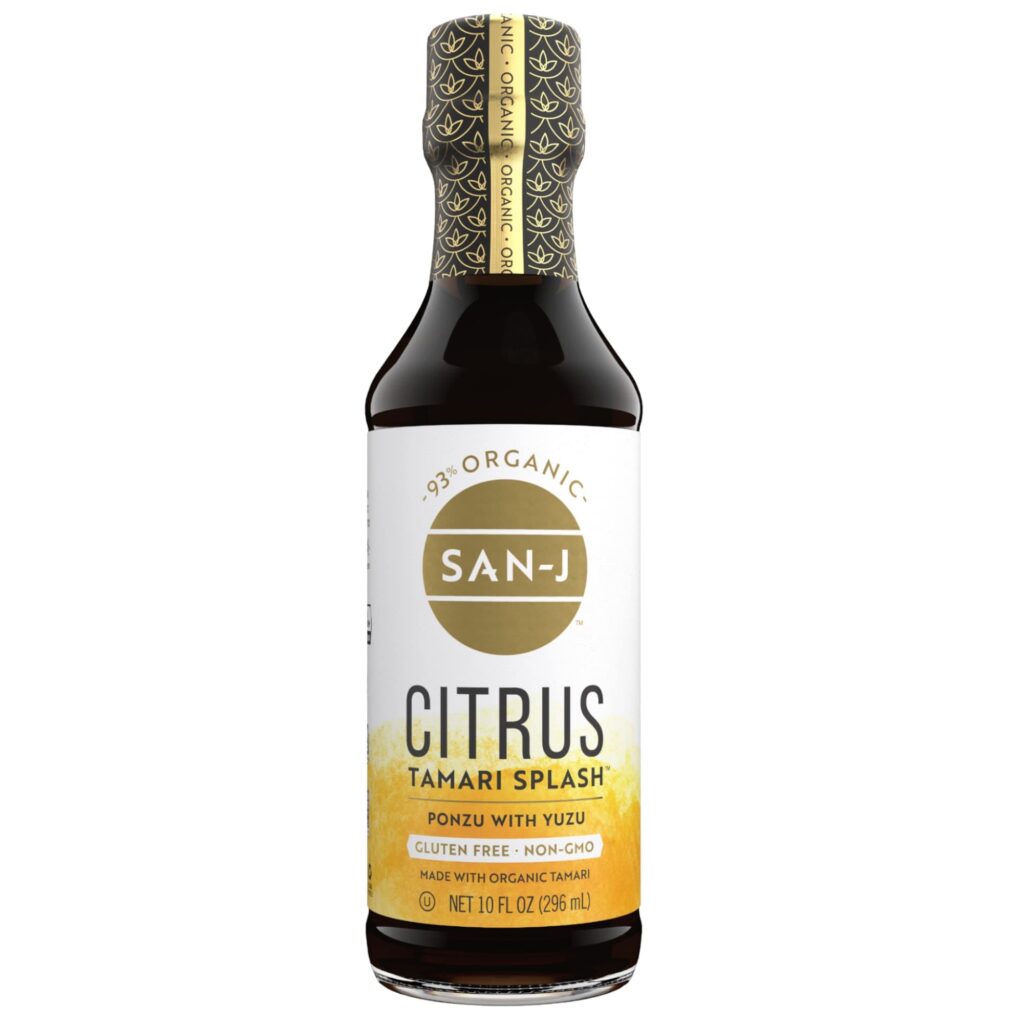
Made with their signature Tamari Soy Sauce and offering distinct, versatile flavors, San-J Citrus Tamari Splash is a fantastic way to effortlessly add excitement to any dish. This flavorful ponzu sauce features a triple citrus blend incorporating yuzu, lemon, and mandarin, providing a delightful citrusy twist.
It complements a wide range of dishes with its tangy and refreshing taste. Notably, it contains 60% less sodium compared to San-J Organic Tamari Soy Sauce, making it a healthier option. Moreover, San-J Citrus Tamari Splash is made with 93% organic ingredients, ensuring its high quality and is certified gluten-free, vegan, kosher, FODMAP friendly, and Non-GMO Project verified. It caters to various dietary preferences and offers a versatile and delicious option to elevate your culinary creations.
Wan Ja Shan Gluten-Free Ponzu Sauce
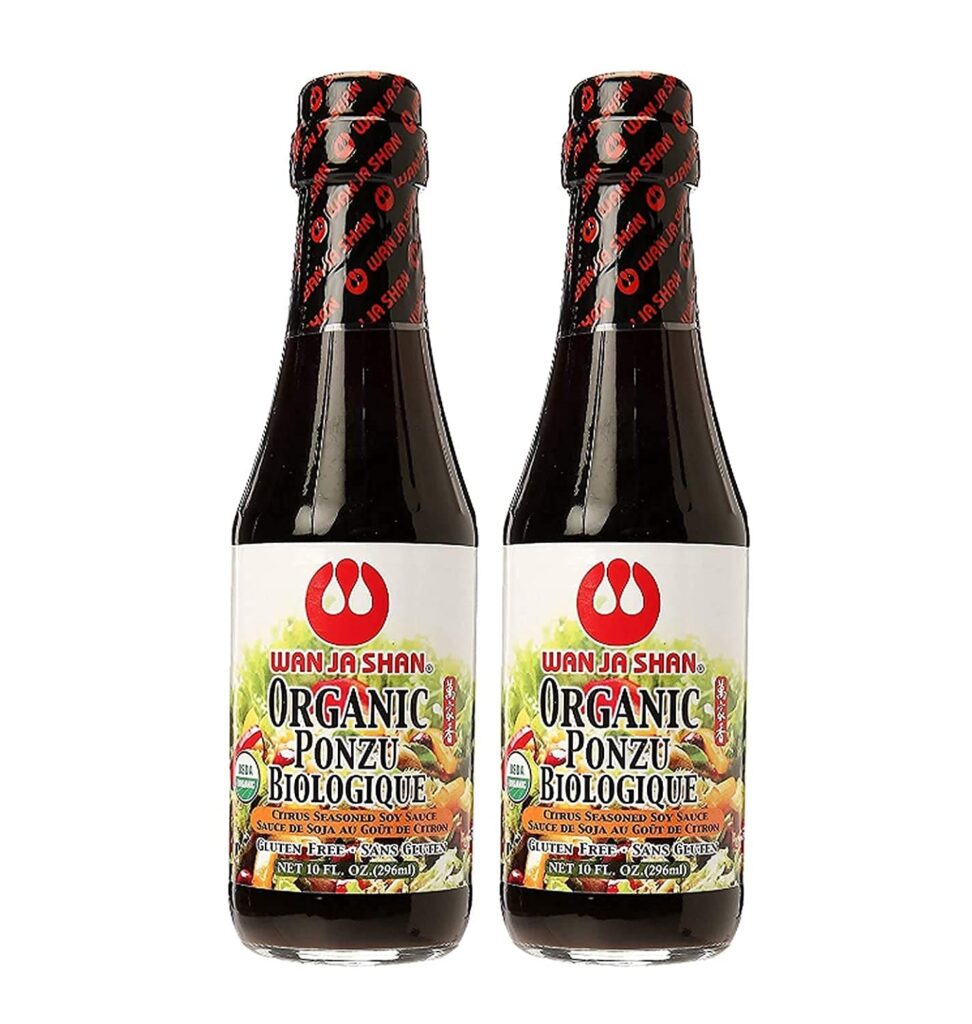
Wan Ja Shan presents their Organic Wheat-Free Ponzu Sauce, crafted from organic wheat-free tamari and a selection of all-natural, organic ingredients. This ponzu sauce offers a tangy citrus flavor that enhances the taste of broiled meats, poultry, seafood, and vegetables.
With no preservatives or fat, it serves as an excellent light dressing for salads, seafood platters, and various other flavor applications. Notably, Wan Ja Shan Organic Wheat-Free Ponzu Sauce has a lower sodium content compared to traditional soy sauce, making it an ideal all-purpose condiment for health-conscious consumers.
Its versatility and refreshing taste make it a great choice for those seeking a flavorful and healthier alternative to enhance their culinary creations.
Otafuku Vegan Ponzu Soy Sauce
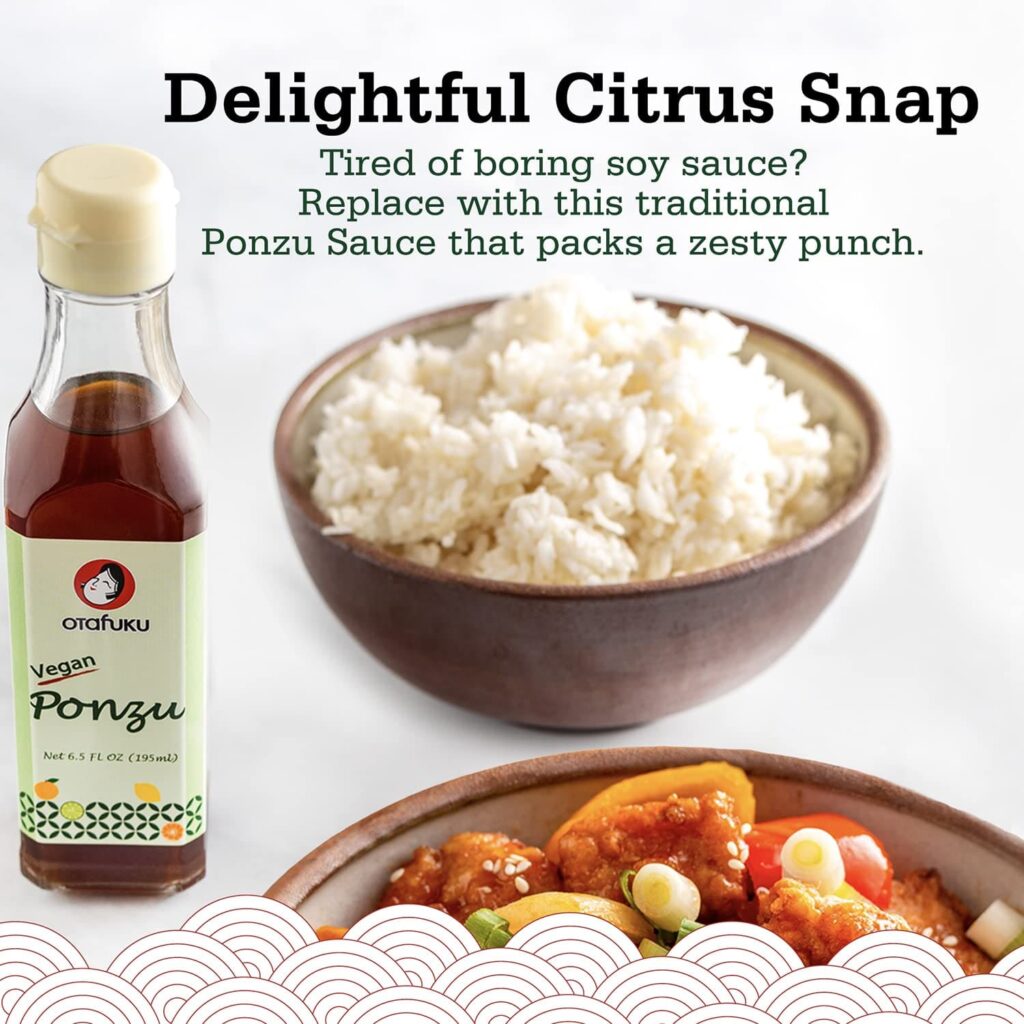
Otafuku offers a vegan version of ponzu sauce that is both gluten-free and suitable for vegetarians. It is known for its refreshing taste and aroma derived from the citrus juice of lemon, Yuzu, Yuko, and Sudachi.
This sauce is free from preservatives, MSG, and gluten, making it a great choice for those who are health-conscious and following a vegan or gluten-free diet. It adds a tangy and citrusy flavor to dishes, enhancing their taste while still adhering to specific dietary preferences.
Ponzu Premium Soy Dressing with Sudachi Citrus
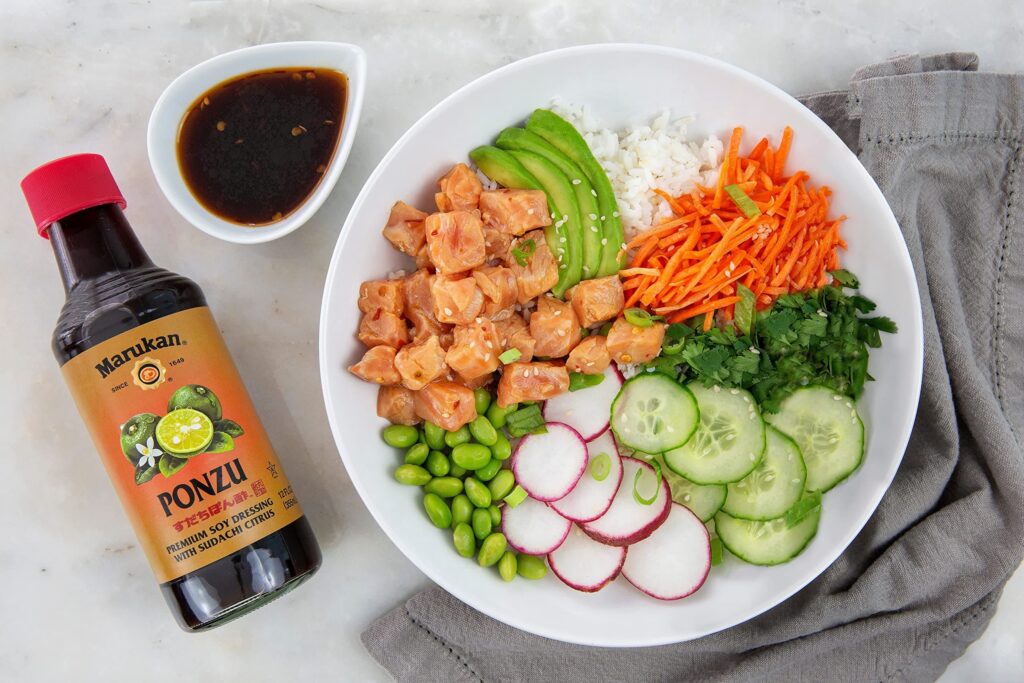
This premium ponzu sauce is made with natural sudachi juice imported from Japan, adding a unique twist to its flavor. While it pairs exceptionally well with steak and BBQ, it can also serve as a substitute for regular soy sauce in a wide range of dishes.
The Sudachi fruit, closely related to yuzu and kabosu, is grown in the Tokushima prefecture of Japan. Known for its abundant vitamin C content and refreshing citrus flavor, Sudachi adds a delightful tanginess and acidity to the ponzu sauce.
The Ponzu Premium Soy Dressing with Sudachi Citrus is certified gluten-free, making it suitable for those with gluten sensitivities or following a gluten-free diet.
Furthermore, it carries the Vegan certification by Natural Food Certifiers and is made with non-genetically modified rice verified by the Non-GMO Project. These certifications ensure that the product meets the standards of quality and transparency in sourcing non-GMO ingredients.
How to use Ponzu sauce?
Ponzu sauce is a versatile condiment that can be used in a variety of ways. Here are some popular ways to use Ponzu sauce:
- As a dipping sauce – You can use gluten-free ponzu sauce as a dipping sauce for salmon. Ponzu sauce pairs well with seafood, including salmon, due to its tangy and citrusy flavor. It can add a refreshing and savory element to enhance the taste of the salmon.
- As a marinade – Ponzu sauce can be used as a marinade for meats, seafood, or tofu. Simply marinate the protein in Ponzu sauce for several hours before cooking.
- As a salad dressing – Ponzu sauce can be used as a dressing for salads or slaws. It pairs well with ingredients like cabbage, carrots, and cucumbers.
- As a flavor enhancer – Ponzu sauce can be used as a finishing sauce to enhance the flavor of a dish. Add a drizzle of Ponzu sauce to grilled fish or roasted vegetables for a burst of flavor.
Ponzu sauce is a versatile condiment that can add a unique flavor to a variety of dishes. Experiment with different uses to find the combination that works best for you.
Health benefits of Ponzu sauce
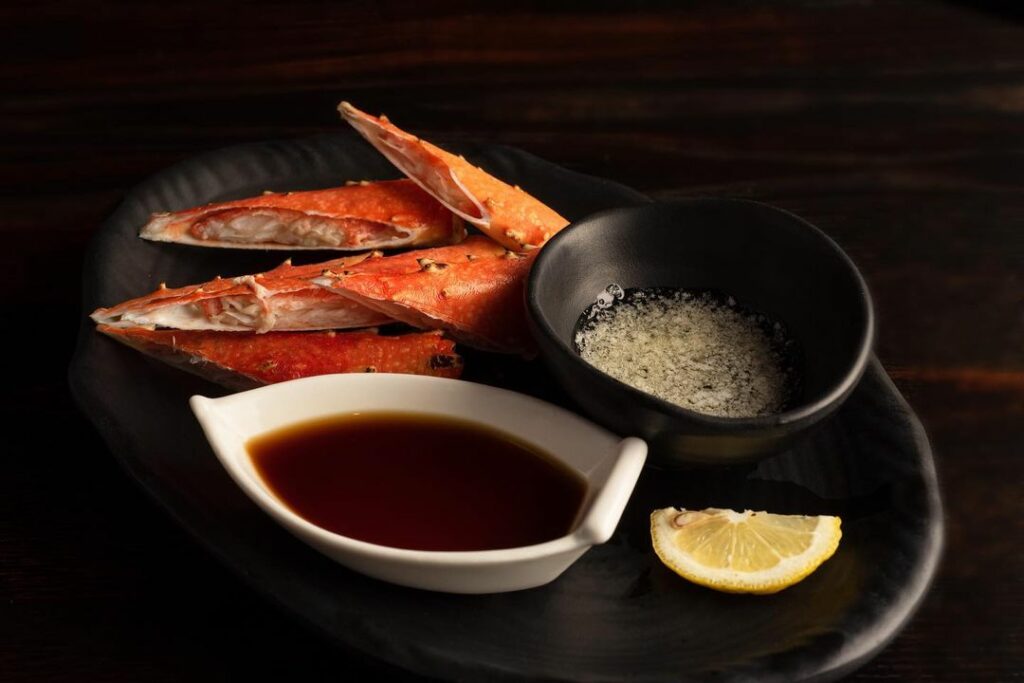
Ponzu sauce not only adds flavor to dishes, but also offers several health benefits. Here are some of the nutritional benefits of Ponzu sauce:
- Low in calories – Ponzu sauce is relatively low in calories, making it a good option for those trying to maintain a healthy weight.
- High in vitamin C – Ponzu sauce is typically made with citrus juice, which is high in vitamin C. Vitamin C is an antioxidant that helps to protect the body from damage caused by free radicals.
- Low in fat – Ponzu sauce is typically low in fat, which makes it a good option for those watching their fat intake.
- Gluten-free options available – Many gluten-free Ponzu sauce brands are available, making it a safe option for those with gluten intolerance.
When comparing the nutritional content and benefits of gluten-free Ponzu sauce to regular Ponzu sauce, there are typically few differences.
However, it is essential to read ingredient labels carefully to ensure that there are no hidden sources of gluten or other allergens. Additionally, some gluten-free Ponzu sauce brands may have slightly different nutritional profiles due to variations in ingredients.
Alternatives to Ponzu sauce
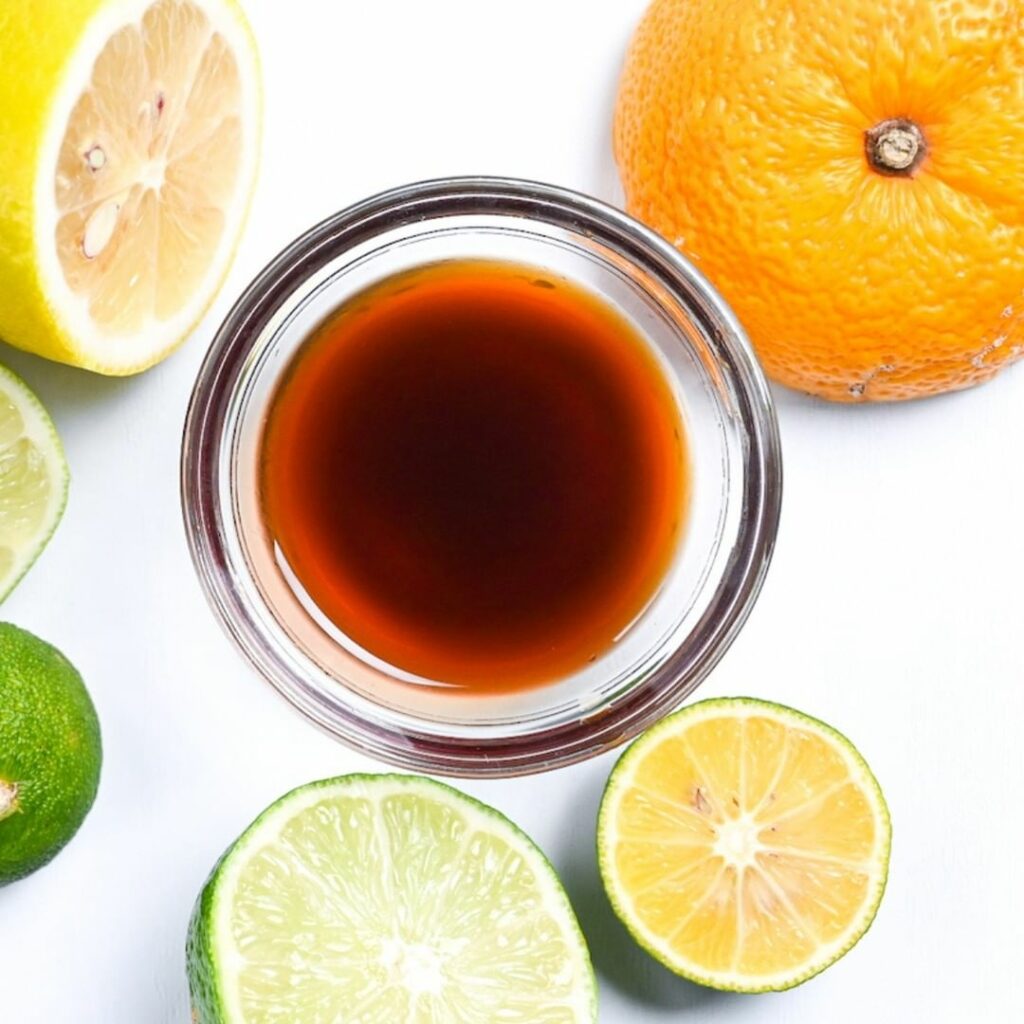
After getting the answer to “is ponzu sauce gluten free”, you or a loved one must be in the situation of not being able to consume gluten, so there are several alternatives to Ponzu sauce that can provide a similar flavor profile. Here are some options:
- Tamari Sauce: Tamari sauce is a gluten-free soy sauce made from fermented soybeans. It has a similar umami flavor profile to ponzu sauce and can be used as a substitute. You can find gluten-free tamari sauce in most grocery stores or health food stores.
- Coconut Aminos: Coconut aminos is a popular gluten-free and soy-free alternative to soy sauce. It is made from the sap of coconut blossoms and has a slightly sweet and savory flavor. While it may not have the exact taste of ponzu sauce, it can work as a substitute in many recipes.
- Homemade Citrus Sauce: You can create a simple homemade citrus sauce by combining fresh citrus juice (such as orange, lemon, or lime) with a little honey or maple syrup for sweetness and some salt for flavor. Adjust the quantities to your taste and use it as a substitute for ponzu sauce.
When comparing the nutritional content and taste of these alternatives to Ponzu sauce, there are some differences to consider. For example, tamari sauce may have a slightly different flavor profile than Ponzu sauce, while lemon juice and soy sauce may be less complex in flavor.
Additionally, the nutritional content may vary between alternatives, so it is essential to read ingredient labels and nutritional information. Choosing an alternative to Ponzu sauce can provide a safe and tasty option for those who cannot consume gluten.
Homemade gluten-free ponzu sauce recipe
Ingredients:
- 1/4 cup mirin
- 1/4 cup gluten-free soy sauce (tamari sauce)
- 1/4 cup fresh-squeezed lemon juice
- 1 tablespoon bonito flakes (optional, for a traditional flavor)
Instructions:
- In a small saucepan, combine the mirin and bring it to a gentle simmer over medium heat. Allow it to simmer for a couple of minutes to cook off the alcohol content.
- Add the gluten-free soy sauce (tamari sauce) to the saucepan and stir well to combine.
- Remove the saucepan from heat and let the mixture cool down for a few minutes.
- Add the fresh-squeezed lemon juice to the saucepan and stir to incorporate all the ingredients.
- If you’d like to add a traditional umami flavor, sprinkle the bonito flakes into the sauce and let them steep for about 5 minutes. Afterward, strain the sauce to remove the bonito flakes.
- Transfer the ponzu sauce to a jar or bottle and let it cool completely before refrigerating.
- Store the homemade gluten-free ponzu sauce in the refrigerator for up to two weeks.
How to identify gluten-free Ponzu sauce?
Identifying gluten-free Ponzu sauce can be tricky, as it is not always clearly labeled. Here are some tips to help you identify gluten-free Ponzu sauce:
- Read ingredient labels – Look for brands that clearly state that they are gluten-free on the label. If this is not indicated, carefully read the ingredient list for any potential sources of gluten.
- Look for certifications – Some gluten-free Ponzu sauce brands may have certifications from organizations such as the Gluten-Free Certification Organization (GFCO). These certifications can help you identify safe options.
- Contact the manufacturer – If you are unsure whether a particular Ponzu sauce brand is gluten-free, contact the manufacturer and ask for more information about their manufacturing processes and ingredients.
It is important to read ingredient labels carefully when identifying gluten-free Ponzu sauce, as some ingredients may not be obvious sources of gluten. Additionally, ingredients can vary between brands, so what is safe for one brand may not be safe for another.
FAQs
What is the difference between tamari and Ponzu sauce?
Tamari and Ponzu sauce are both soy-based condiments, but they have some key differences. Tamari sauce is a type of soy sauce that is made with little to no wheat, making it a good option for those with gluten intolerance. It has a stronger, richer flavor than regular soy sauce and is often used as a dipping sauce or marinade for meats and vegetables.
Ponzu sauce, on the other hand, is a citrus-based sauce that is made with soy sauce, rice vinegar, citrus juice, and sometimes other ingredients like bonito flakes or kombu seaweed. It has a tangy, citrusy flavor and is often used as a dipping sauce or marinade for seafood, grilled meats, and vegetables.
Is all soy sauce gluten-free?
While some soy sauce brands are gluten-free, others may contain wheat as a filler ingredient. Therefore, it is important to check the ingredient list carefully to determine whether a particular soy sauce is gluten-free.
Tamari sauce is often a safer option for those with gluten intolerance, as it is typically made without wheat.
Can I use Ponzu sauce in place of soy sauce?
Yes, Ponzu sauce can be used in place of soy sauce in many recipes. However, it is important to note that Ponzu sauce has a distinct citrusy flavor that may not be suitable for all dishes.
It is best used in recipes where a tangy, citrusy flavor is desired, such as with seafood or grilled vegetables.
Can I make gluten-free Ponzu sauce at home?
Yes, it is possible to make gluten-free Ponzu sauce at home. Simply use gluten-free soy sauce and rice vinegar, and add citrus juice and other ingredients like mirin, bonito flakes, or kombu seaweed as desired.
There are many recipes available online that provide guidance on how to make gluten-free Ponzu sauce at home.
Are there any other benefits to a gluten-free diet?
There are several potential benefits to following a gluten-free diet beyond those related to gluten intolerance or celiac disease. For example, some people report improvements in digestive health, reduced inflammation, and increased energy levels.
However, it is important to note that a gluten-free diet can be more challenging to follow and may require careful planning to ensure that all nutrient needs are being met. Additionally, it is important to speak with a healthcare provider before making significant changes to your diet.
What are the potential health risks of consuming gluten?
The potential health risks of consuming gluten can vary depending on the individual. For those with celiac disease or gluten intolerance, consuming gluten can cause a range of symptoms, including abdominal pain, bloating, diarrhea, and fatigue.
In more severe cases, consuming gluten can lead to damage to the lining of the small intestine, which can result in long-term health problems.
How do I store Ponzu sauce?
To store Ponzu sauce, it is important to keep it in a cool, dry place away from direct sunlight. Once opened, Ponzu sauce should be stored in the refrigerator and consumed within a few weeks.
It is important to check the expiration date on the bottle and to discard any sauce that has gone bad or has an off smell or taste. Additionally, it is important to avoid contaminating the sauce with dirty utensils or leaving it out at room temperature for too long.
Can Ponzu sauce be frozen?
Ponzu sauce can be frozen, but it is important to note that freezing can alter the texture and flavor of the sauce. To freeze Ponzu sauce, transfer it to an airtight container or freezer bag and label with the date.
It can be stored in the freezer for up to several months. When ready to use, thaw the sauce in the refrigerator overnight and stir well before using. It is important to avoid refreezing thawed Ponzu sauce.
How do I know if Ponzu sauce has gone bad?
Ponzu sauce can go bad over time, which can be indicated by changes in color, texture, or flavor. Here are some signs that Ponzu sauce may have gone bad:
- Mold or discoloration – If you see any mold or discoloration in the sauce, it should be discarded.
- Separation – If the sauce has separated into distinct layers, it may have gone bad.
- Foul odor – If the sauce smells off or has a sour or rancid odor, it may have gone bad.
- Off-taste – If the sauce tastes off or has a bitter or sour taste, it may have gone bad.
- It is important to note that these are general guidelines, and the specific signs of spoilage may vary depending on the brand and recipe.
Is Ponzu sauce vegan?
Ponzu sauce can be vegan, but it depends on the specific recipe and brand. Some Ponzu sauce recipes may include fish-based ingredients like bonito flakes, while others may be made with plant-based ingredients only. It is important to check the ingredient list carefully and to look for certifications or labels that indicate that the sauce is vegan.
Conclusion
Considering all the facts, determining whether is Ponzu sauce gluten free is not a simple yes or no answer. While many of the main ingredients in Ponzu sauce are typically gluten-free, there are some potential sources of gluten in the manufacturing process or from added ingredients like soy sauce or rice vinegar.
However, there are several gluten-free Ponzu sauce brands available that offer a safe option for those with gluten intolerance. It is important to read ingredient labels carefully and to choose certified gluten-free products when possible. Additionally, there are several alternatives to Ponzu sauce available for those who cannot consume gluten.
Keep reading: White Vinegar vs White Wine Vinegar: What’s The Difference?